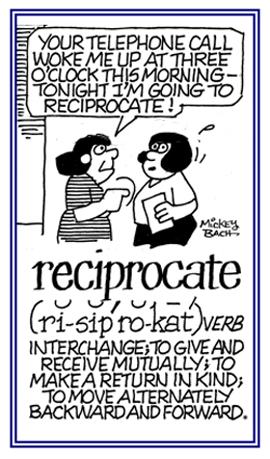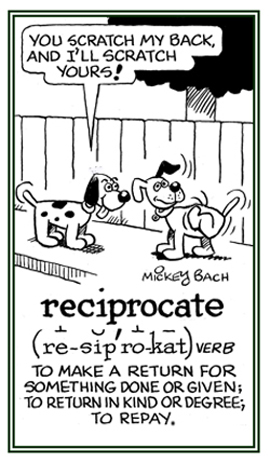reciproc-
(Latin: reciprocus, turning back the same way, alternating; turning backward and forward; to give, to do, to feel, or to show in return)
reciprocal (adjective) (not comparable)
1. A reference to something that is mutual or done in return; given or felt by each toward the other; mutual: James and Jerry had reciprocal respect for each other.
2. Descriptive of something given, performed, felt, etc., in return; concerning something given or shown by each of two sides or people to the other: After the German exchange group visited Tamworth, the English students planned on a reciprocal visit the following year.
3. Conveying a corresponding; matching; complementary; equivalent: The members of the fitness studio were able to have reciprocal privileges at other health clubs.
4. In grammar, with reference to a pronoun or verb; expressing mutual relationship or action: "Each other” and “one another” are reciprocal pronouns.
5. Pertaining to something which is inversely related or proportional; opposite: The contrasting, or reciprocal, color of fabric used for the lining was bright red as opposed to the bright blue color of the dress.
6. Etymology: from Latin reciprocus, "turning back the same way, alternating", which stands for reco-procos and is a compound of the adjectives recos, "turning backward", and procos, "turning forward"; therefore, reciprocus originally meant "turning backward and forward".

© ALL rights are reserved.
Go to this Word A Day Revisited Index
2. Descriptive of something given, performed, felt, etc., in return; concerning something given or shown by each of two sides or people to the other: After the German exchange group visited Tamworth, the English students planned on a reciprocal visit the following year.
3. Conveying a corresponding; matching; complementary; equivalent: The members of the fitness studio were able to have reciprocal privileges at other health clubs.
4. In grammar, with reference to a pronoun or verb; expressing mutual relationship or action: "Each other” and “one another” are reciprocal pronouns.
5. Pertaining to something which is inversely related or proportional; opposite: The contrasting, or reciprocal, color of fabric used for the lining was bright red as opposed to the bright blue color of the dress.
6. Etymology: from Latin reciprocus, "turning back the same way, alternating", which stands for reco-procos and is a compound of the adjectives recos, "turning backward", and procos, "turning forward"; therefore, reciprocus originally meant "turning backward and forward".
Reciprocal, when all things are considered, is a compound adjective based on the elements re-, "back, backward" and pro-, "for, forward".

Go to this Word A Day Revisited Index
so you can see more of Mickey Bach's cartoons.
1. Either of a pair of numbers whose product is 1: The number 3 is the reciprocal of 1/3 and 1/3 is the reciprocal of 3.
2. Something that is interchangeable with another person or thing: A serving of peas for dinner was the reciprocal for the beans, which was used up the day before.
2. Something that is interchangeable with another person or thing: A serving of peas for dinner was the reciprocal for the beans, which was used up the day before.
A behavior occurring between individuals who are not related: Reciprocal altruism is based on the principle that help offered in one instance will be returned when the need for help is reversed.
A genetic cross of two genotypes, or creatures, in which gender influences the outcome: The reciprocal cross of a male horse with a female donkey results in a "hinny",, while the cross of a female horse with a male donkey results in a "mule".
In psychiatry, a social learning theory, that behavior is a result of the interplay between cognitive and environmental factors: People learn reciprocal determinations by observing others and imitating their actions and negative behavior patterns can be suppressed or eliminated by having someone learn different ways of behaving from other people who are role models.
reciprocal hybrids (pl) (noun)
Two hybrids, one descended from male of one species, and the female of another species, the other from a female of the first and a male of the second: Reciprocal hybrids, for example, are the mule and the hinny, offspring of a male horse or stallion and a female donkey.
1. A condition in which the action of one group of a pair of antagonistic muscles is inhibited by the excitation of the other group: An example of reciprocal inhibition is when the biceps are prevented from contracting and bending the arm at the elbow, while the triceps are extending the arm, which is a result of reciprocal innervation.
2. The inhibition of an anxiety-provoking response by the practice of deep muscle relaxation: Reciprocal inhibition relates to behavior therapy in which the patient is exposed to anxiety-producing stimuli while in a controlled state of relaxation so that the anxiety response is gradually inhibited.
2. The inhibition of an anxiety-provoking response by the practice of deep muscle relaxation: Reciprocal inhibition relates to behavior therapy in which the patient is exposed to anxiety-producing stimuli while in a controlled state of relaxation so that the anxiety response is gradually inhibited.
reciprocal inhibition and desensitization (s) (noun), reciprocal inhibitions and desensitizations (pl)
In psychiatry, a form of behavior therapy in which the patient, while made to relax in comfortable surroundings, is gradually exposed to increasing amounts of anxiety-provoking stimuli: During reciprocal inhibition and desensitization, the patient can learn to tolerate these stimuli and may eventually learn to dissociate the anxiety from them.
In physiology, the use of muscles around the joints: In reciprocal innervation, the motor centers are connected in pairs in such a way that when one is excited the motor center of the corresponding antagonist is inhibited.
A relation of mutual dependence or action or influence: Jane was very happy with the reciprocality among the neighbours in the condo building because of the friendliness and returned help when asked for or needed.
reciprocalize (verb), reciprocalizes; reciprocalized; reciprocalizing
To interchange actions with each giving or doing to the other the same thing: After receiving a Christmas present from her neighbor, Mrs.Evans reciprocalize by giving her a present as well.
reciprocally (adverb), more reciprocally, most reciprocally
Descriptive of how something affects the other and is equally affected by it; interchangeably; mutually: After being humiliated by her classmate, Judy responded reciprocally by calling her a real jerk and an imbecile..
The quality or condition of being equally mutual in returning something: Mary appreciated the reciprocalness of her friend helping her with the shopping after she did the same a week before.
reciprocate (ri SIP ruh kayt") (verb), reciprocates; reciprocated; reciprocating
1. To give, to feel, to do something similar in return for what each one has done to the other one: Monica was treated very nicely by her boyfriend and so she reciprocated by giving him a hug.
3. Etymology: from Latin reciprocare "to move back" and "forth"; from re-, "backward" + pro, "forward" + -cate, "normally a verb ending".

© ALL rights are reserved.

© ALL rights are reserved.
Go to this Word A Day Revisited Index
Anyone who reciprocates is returning the same kind of treatment that another person has done to him or to her, whether it is good or bad.
2. To interchange; each person or group giving or doing to the other the same thing; to give, to feel, etc., in return: Alice loved her daughter Lucy very much, and this love was certainly reciprocated by Lucy towards her mother as well.3. Etymology: from Latin reciprocare "to move back" and "forth"; from re-, "backward" + pro, "forward" + -cate, "normally a verb ending".


Go to this Word A Day Revisited Index
so you can see more of Mickey Bach's cartoons.
reciprocating (adjective), more reciprocating, most reciprocating
Pertaining to something that causes or moves backward and forward: Mr. Young read about the reciprocating engine that was supposed to power fabric mills throughout the country.
Inter-related cross references, directly or indirectly, involving word units meaning "another, other, different, alternating, varied, changing": ali-; allo-; alter-; allelo-; hetero-; mut-; poikilo-; vari-.
Showing page 1 out of 2 pages of 20 main-word entries or main-word-entry groups.

